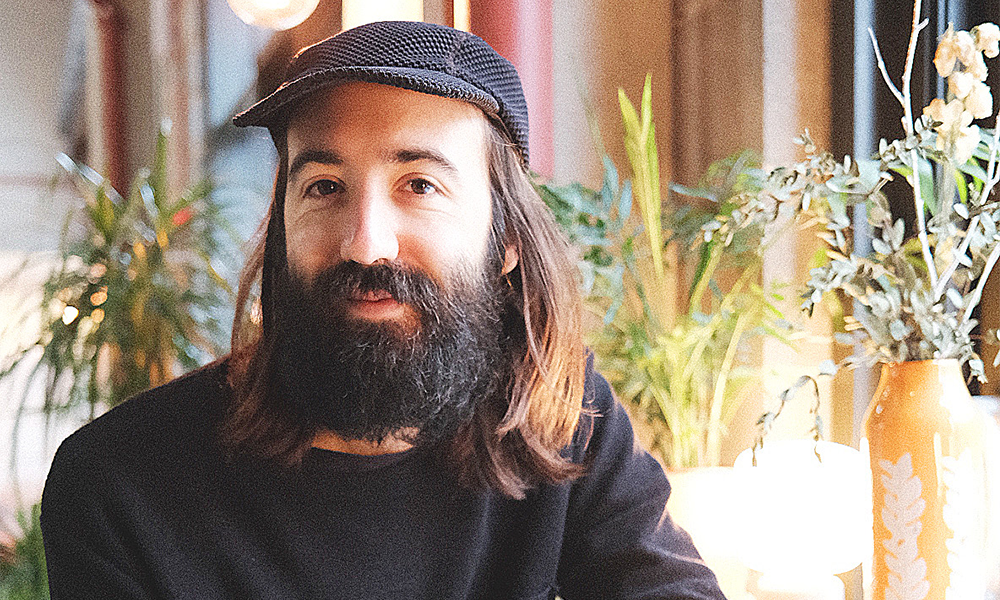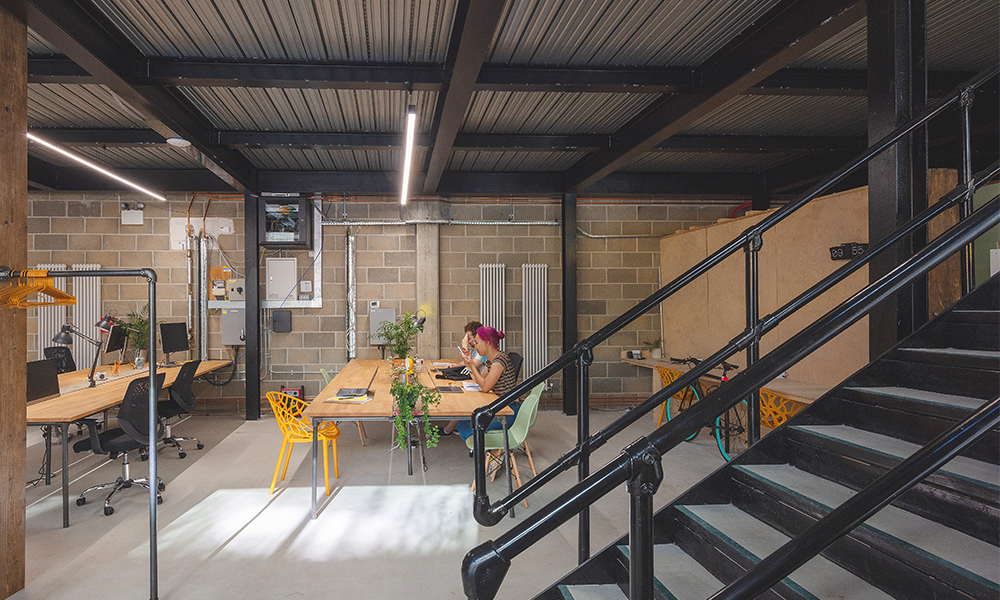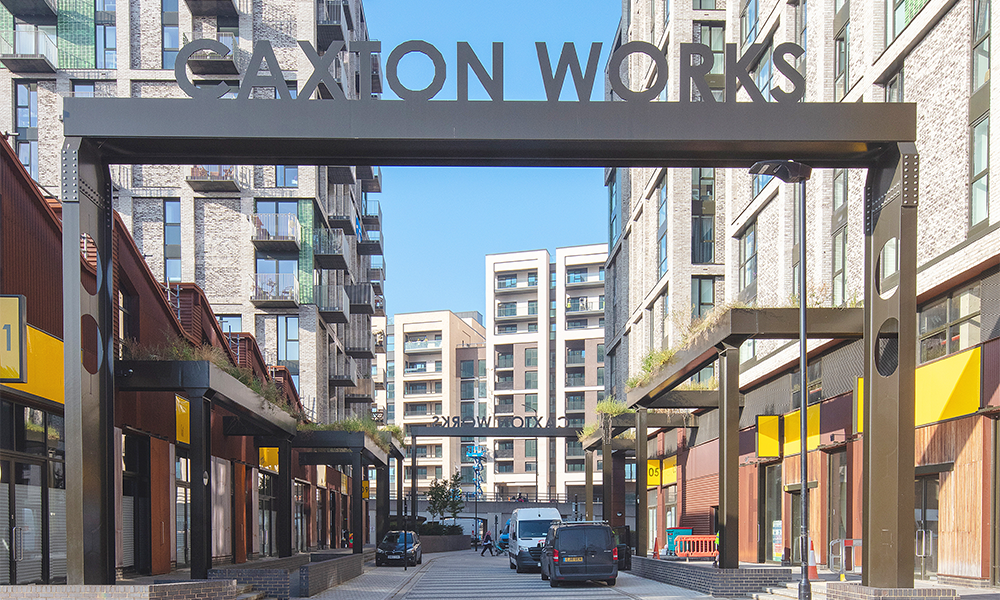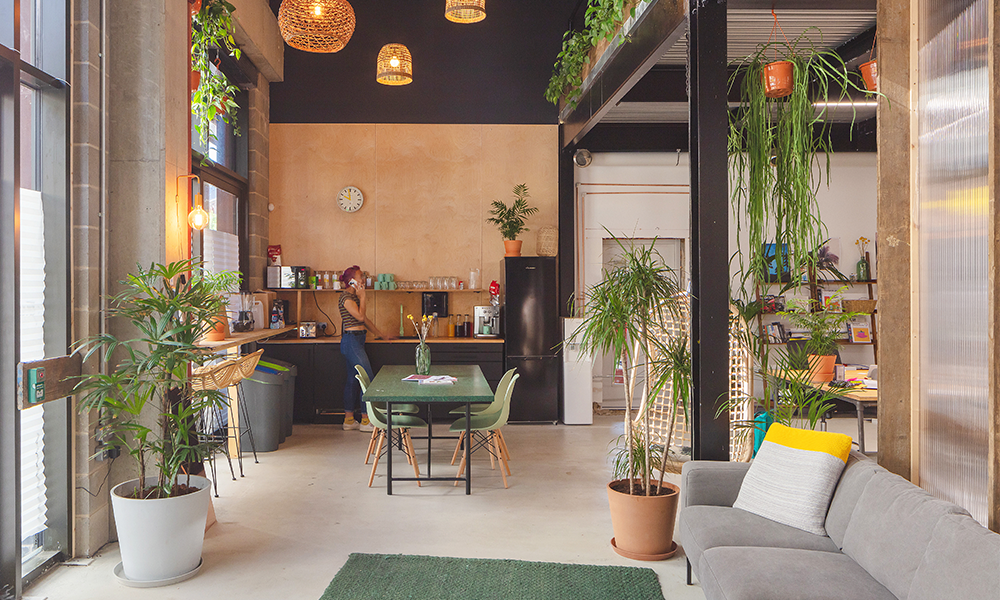How serial entrepreneur Jonathan Fren landed his latest business at Caxton Works in east London

Subscribe to Wharf Life’s weekly newsletter here
BY LAURA ENFIELD
Black swan” is the image that comes to mind when trying to sum up Jonathan Fren.
That’s because the entrepreneur appears calm on the surface but there’s a sense he’s working busily beneath.
The founder of Canning Town co-working space Keyboards & Dreams, is something of an anomaly.
When we sit down to chat, the mellow-voiced hipster seems exactly the sort of person who would own an easygoing office complex in Caxton Works, where members are surrounded by plants and stripped back decor.
He said it all came about “by accident” but I’m not sure that’s the right word.
“I randomly came across the development about three years ago and was interested,” said Jonathan. “I liked the vibe of what they were doing with independent businesses and I liked the architecture of the space.
“I thought it would be a cool place to have a community. It’s a very residential area and, with Keyboards & Dreams, I wanted to create a living room that people could go to when they’re not working from home.”
This is not the first business the 32-year-old has owned. It isn’t even the second or third.
Jonathan has never totted up the companies he’s run, but I have. It’s 11.
The first, Magivend, he started when he was 10 after seeing some sweet machines for sale at Exchange & Mart.
“My parents were always entrepreneurs, and supported me,” said the Northampton native. “I bought three machines and put them in our local health club — they paid for themselves in a month, so I kept buying more and putting them around town.”
By the age of 12, he had 32. By 13 he was “bored” and bought tyre sealant franchise Nopunctures.

Despite its success, nine months later he gave it up as “the need to be face-to-face with businesses as a 13-year-old was difficult”.
There was no stopping him now though – at 14 he left school with no formal qualifications and became the youngest person to attend the Open University, studying robotics under a special arrangement with the council.
“I wasn’t allowed to ever meet my tutors as staff weren’t vetted for working with under-18s,” said Jonathan.
“And I only spent two weeks actually preparing for the exams as I was too busy learning about the internet.”
He started taking apart websites and learning how they worked, building CaribGo, a revolutionary webmail client but said he was beaten to the punch by Gmail.
At 16, he moved to Barbados to run a watersports business, but within months realised his passion lay in cyberspace.
“I’d gained some great contacts online, and spent the next few years travelling and building things for clients like Barclays Bank, General Motors, and Oxfam,” he said.
“None of them knew my age – it was my most closely guarded secret. But of course I’d have told them if they’d ever asked.”
The rest of his CV includes co-founding identity management service ProfileBuilder, face-to-face networking platform PowerMeeter, fashion designer finder Osmoda and magazine It’s Rude To Stare.
Some only lasted months but by 2016 he seemed to have found a more secure footing in Clerkenwell, spending four years running tech company Rebel Minds.
Exhausted yet? So was Jonathan.

“By then I was 25 and I was finding it all really stressful,” he said.
“The company I had created had become something so different from what I started.
“I ended up with 20 employees in central London doing things I just didn’t believe in. We ended up being an agency just making websites for clients.
“I wanted to do super awesome things and have products that I really believed in. I tried to pivot it first, but I was in this really bad place and ultimately decided to shut it down.”
He said making all his staff redundant was “the hardest thing I’ve ever done in my working life”.
The phoenix from the flames was his office block nestled among the jewellers in Hatton Garden.
During the five years the tech company existed, Jonathan had acquired more floors of the building and the first Keyboards & Dreams evolved naturally.

“We had a really cool space and I’d always had lots of friends interested in it,” said Jonathan.
“Initially I just rented it to them for their tech companies and then to more and more people and eventually it became this great co-working space.”
He managed the building remotely for a few years while travelling through Paris, Amsterdam, Berlin and San Francisco and had no intention of launching a second site. But then he discovered Canning Town.
“I didn’t know much about the history of the area when I started, but now I can see that in three or four years it is going to really go up,” said Jonathan.
“At the moment we are a little bit in sleepy mode, but so much has happened just in the year we have been at Caxton Works.”
These days Jonathan lives in Poland with his Yoga instructor girlfriend, but moved back to the capital to get the unit ready for launch in November 2020.
He said: “We had a waiting list of about 60 people but then Covid rules changed and we ended up with 10 members. It was a lot less people than I expected, but I didn’t want it to be an empty building, I wanted it to be used.”
Today, the site has about 25 members and space for another 95.
But Jonathan is confident it will take off and he has just launched Yoga space Wonderful Things in the unit next door.
“The concept is to create a really modular space that is not just about working but enabling people to do whatever they’re doing,” he said.
“We have podcast spaces, private desks, open-plan spaces, storage, meeting rooms, a photography area, lots of different spaces to enable people to do lots of different things. I’m super optimistic.
“Throughout Covid we have had lots of people drop out, but also people joined. Clerkenwell has been used throughout the pandemic.
“With Canning Town we have had nowhere near the number of people walk through the doors I expected, but I think that’s part of being a new place in a new area.”
So was this really all by accident? Like the black swan, it seems more like effort rewarded.
Read more: See James Cook’s typewriter art at Trinity Buoy Wharf




One Reply to “Canning Town: How Keyboards And Dreams is a workspace created (almost) by accident”
Comments are closed.